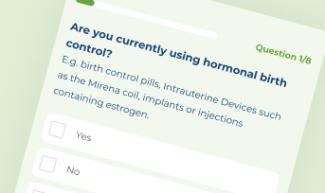Tips to help you handle menopause in the workplace

Trying to adjust to your menopause symptoms while still focusing on your career? You’re not alone! According to a 2023 study in Environmental Research and Public Health, around one-third of women experience menopause symptoms that cause difficulties coping at work.1 Adjusting to this new phase of life and all its symptoms while working can be challenging, but there are ways to help make the transition easier.
Menopause symptoms at work
On top of the physical symptoms you can experience during the menopause transition, like hot flashes, chills and dry skin,2 there are plenty of psychological symptoms of menopause that can affect your work, like:
- Feeling moody
- Being easily irritated
- Anxiety or low mood
- Memory issues
- Fatigue
- Brain fog
While all of these are normal, natural (and rather unfortunate!) symptoms of menopause, it doesn’t make them any easier to deal with while trying to remain professional at work. If any of these symptoms become difficult to manage, talk to your healthcare professional. In the meantime, here are some ways to help make your workplace and work life a little more comfortable as you navigate this change.
Tips to help manage menopause symptoms while working
- Wear layers. Office temperatures can be unpredictable, so be prepared! Dress in layers you can shed if you experience a hot flash and keep a sweater or small blanket at your desk to bundle up if you feel chilly.
- Bring a fan, space heater or cooling pack. Fans and cooling packs can provide much-needed relief during a hot flash. If you’re dealing with chills or a particularly cool office, consider bringing in a small space heater for your desk. Be polite and check with your desk mates, and be sure to check with management when bringing in any small appliance, as some buildings have codes restricting what items are acceptable.
- Take frequent breaks. Cut yourself some slack! Walk around the office, step outside for some fresh air, or head to the breakroom for a change of scenery.
Tips to help make your workplace menopause-friendly
- Talk to other women. There’s power in numbers! Look around your office (or your next Zoom call) for people who may be going through something similar. Consider setting up a group chat or text chain to brainstorm ways to make work life easier for all of you. If nothing else, having others who can empathize with your plight might make coming to work a little easier.
- Talk to men in your work group as well. Even though the menopause journey is specific to reproductive organs in women, men may also benefit from education and exposure in the workplace as well. Because all men know people who have been through menopause, they can become helpful advocates with their coworkers, parents, siblings, wives, daughters, etc.
- Talk to your healthcare professional. It goes without saying that a great relationship with your healthcare professional can help you get through this change, but be honest about how your symptoms are affecting your day-to-day as well. They may be able to offer assistance (including medications, therapies or suggestions) on how to ease these symptoms while at work.
- Talk to your manager. If you have a good relationship with your manager and feel comfortable, you might want to tell them about what you’re going through. Your manager may be able to provide accommodations to make working more comfortable for you. If nothing else, it will give them context as to why you may not seem like yourself.
- Talk to human resources (HR). If you feel comfortable, you could talk to human resources at your company. If you decide to have a conversation, it might be helpful to go in with action items that would benefit your work performance. This could be things like flexible work hours, regular breaks, reimbursement for items to make the workplace more comfortable, and adjustments to your assigned tasks.

Is Clearblue® Menopause Stage Indicator right for me?
Take our simple quiz to find out!
Tips to help you handle awkward situations
In an ideal world, workplaces would be very accommodating and understanding of their employees and what they’re going through, though unfortunately this isn’t always the case. Here are a few ideas for dealing with some potentially awkward situations:
- Your boss is unsupportive of your changing needs. If discussing your necessary accommodations doesn’t go as you hoped, first look to see if there is a compromise: If you asked to go fully remote, ask if you could work from home two days a week instead. If you have a job where you are required to be on your feet, ask if you could have a chair or stool or perhaps shorter, more frequent breaks. If your manager is completely dismissive or uncooperative, consider discussing the matter with human resources.
- You’re struggling with male co-workers. If something insensitive is said to you, in jest or otherwise, you are well within your rights to say, “That’s inappropriate.” If you’re being ridiculed or harassed for your situation, go directly to your manager and human resources.
- You feel your workplace may be discriminating against you. If you feel you are being treated unfairly after disclosing your condition to your boss or human resources, look into your rights and how you can speak up. Share examples of discrimination you’ve experienced, such as reduction of work hours, changes in pay, inappropriate remarks in email, changes in work expectations, etc.
Be kind to yourself
- Take advantage of workplace programs. Many workplaces offer discounted therapy, access to meditation apps or discounts on gym memberships, all of which could help you manage your symptoms.
- Give yourself some grace. This is a whole new phase of life! It will undoubtedly be an adjustment, but just like any other time of change, you’ll get through it.
Related Articles
Sources
- D'Angelo S, Bevilacqua G, Hammond J, Zaballa E, Dennison EM, Walker-Bone K. Impact of menopausal symptoms on work: findings from women in the Health and Employment After Fifty (HEAF) study. Int J Environ Res Public Health. 2022;20(1): 295. doi:10.3390/ijerph20010295. Updated December 24, 2022. Accessed October 24, 2023. https://www.ncbi.nlm.nih.gov/pmc/articles/PMC9819903/
- Mayo Clinic. Menopause. Updated May 25, 2023. Accessed October 26, 2023. https://www.mayoclinic.org/diseases-conditions/menopause/symptoms-causes/syc-20353397

Know more about the menopause journey
Download the Menopause Stage - Clearblue® me app to access relevant educational content, track your symptoms & periods

Can I get pregnant if I'm over 35?
If you’re over 35 you may need a little more patience and greater understanding about your fertility window to help you have a baby naturally.





